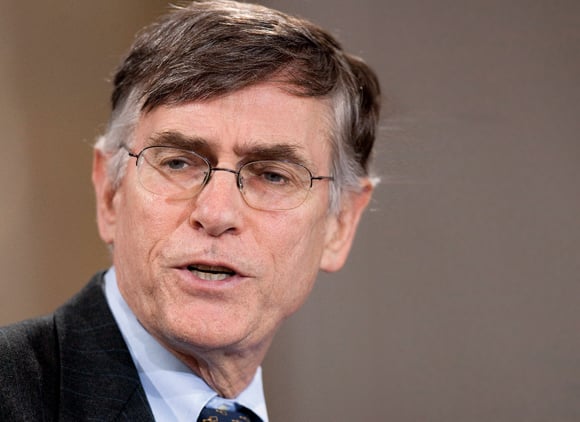Finra's CEO Richard Ketchum criticized a Department of Labor proposal to raise investment advice standards for brokers Wednesday, saying it might cause firms to curtail -- or even discontinue -- sales of individual retirement accounts.
Mr. Ketchum said the
DOL proposal would create a bias against financial products with higher fees, even if they're the best recommendation for a client, and that it could force firms to move to a fee-based rather than brokerage business model. He also said it's not a good idea to regulate retirement products, such as 401(k)s and IRAs, differently than other investments.
The Securities and Exchange Commission should take the lead in drafting a fiduciary-duty rule “across all securities products,” Mr. Ketchum told reporters on the sidelines of the Financial Industry Regulatory Authority Inc's annual conference in Washington. SEC Chairwoman Mary Jo White
favors such a rule, but has acknowledged it's not clear whether she has the support of the five-member panel to make a proposal.
Although Mr. Ketchum said Finra exams consistently show instances of unsuitable sales and improper disclosures, he defended current broker-dealer oversight conducted by his organization. He criticized rhetoric surrounding the DOL proposal that portrays brokers preying on clients.
“Depictions of the present environment as providing 'caveat emptor' freedom to broker-dealers to place investors in any investment that benefits the firm financially with no disclosure of their financial incentives or the risks of the product are simply not true,” Mr. Ketchum said
in a speech at the conference. “Nor are they an accurate starting point to justify a new standard of care.”
Mr. Ketchum supported the thrust of the DOL proposal, which is designed to reduce conflicts of interest for brokers that can lead them to put clients in high-fee products that erode their nest eggs, but said it would create practical problems for brokers.
He warned that the primary mechanism in the DOL rule that would allow brokers flexibility in charging clients for their services — a legally binding contract requiring them to act in the clients' best interest — would send disputes over fiduciary duty into legal and arbitration forums without instruction on how to rule on compensation practices.
“It is not that Labor's conflict concerns don't have validity; it is that I fear that the uncertainties stemming from contractual analysis and the shortage of useful guidance will lead many firms to close their IRA business entirely or substantially constrain the clients that they will serve,” Mr. Ketchum said.
The DOL encouraged Mr. Ketchum to write a comment letter about its fiduciary-duty proposal. The comment period was recently
extended by 15 days.
“We are in the midst of the public comment period and hope that these and other concrete suggestions of how to improve the proposal will be submitted for the record,” DOL spokesman Michael Trupo said in a statement.
Mr. Ketchum does favor a best-interest standard for brokers, a bar that investment advisers already meet. He said a fiduciary standard for brokers should emphasize that they act in the best interest of their clients, require brokers to set up structures to manage conflicts of interest, strengthen disclosure to investors and address compensation differences between investment products.
“I continue to believe that the clarity of a 'best interest of the customer' standard would be an important step forward in encouraging firm compliance cultures that translate to consistent actions to place the interests of the customer first,” Mr. Ketchum said.
Mr. Ketchum said the goal of his speech was to “lower the noise level” in the fiduciary-duty debate and focus on practical ways for the industry to institute the standard.
“Right now, my role is just to try to move this forward from the standpoint of constructively raising what I think are the issues,” Mr. Ketchum told reporters.







